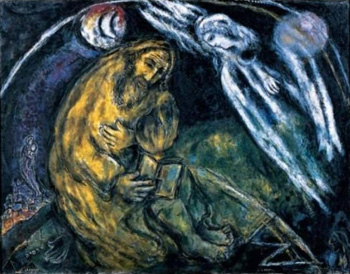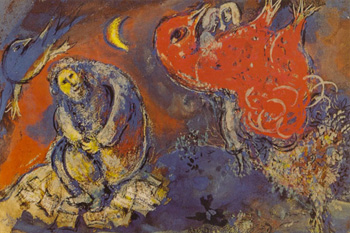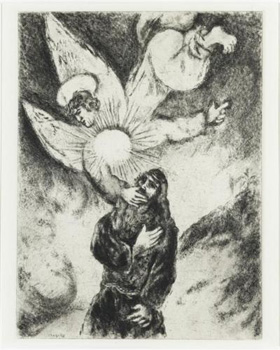Jeremiah: Human Struggle with the Divine Call
For Sunday August 25, 2013
Lectionary Readings (Revised Common Lectionary, Year C)
Jeremiah 1:4–10 or Isaiah 58:9b–14
Psalm 71:1–6 or Psalm 103:1–8
Hebrews 12:18–29
Luke 13:10–17
I have a friend who had two successful ministries that both ended badly. There was nothing funny about it at the time, but later she joked that once the institution failed her, and that the other time she failed the institution. Both experiences, she wryly observed, proved the adage that individuals exist for institutions and not vice vera. The institution always wins.
The passage of time gave her some psychological space to think about what had happened. A constellation of questions offered a rich fund for critical reflection. Maybe she had a quirky personality? Was there a bad fit between person and organization? What about the residue of regret, discouragement, and feelings of powerlessness about the past? Was she damaged goods with no prospect for the future?
 |
Marc Chagall, The Prophet Jeremiah. |
Most of all, she wondered how God's call fit with human failure.
Thinking about my friend made me thankful for Jeremiah. His book begins by describing how God called him to be a prophet to Judah. God's call on his life began not only forty years of faithful if reluctant service (627–587 BC), but also forty years of deeply personal struggle for the "weeping prophet." Jeremiah's many troubles remind us that there's no call without conflict.
One of my favorite books about our human struggle with God's call is The Diary of a Country Priest by George Bernanos. In the words of the young and earnest priest in Bernanos's novel, "We pay a heavy, very heavy price for the super-human dignity of our calling. The ridiculous is always so near to the sublime. And the world, usually so indulgent to foibles, hates ours instinctively."
Jeremiah responded to God's call with protests of personal inadequacies. His sense of inadequacy didn't derive from petty problems overcome by cheerful determination, from false modesty, nor was it a mere rhetorical device used by the writer. Across forty years Jeremiah struggled with God's call on his life, with a sense of failure, with virulent opposition from critics, and with deep discouragement.
His response recalls how Moses protested God's call on his life with a litany of fears — lack of confidence, limited skill, insecurities about personal identity, and fear of rejection (Exodus 3–4), Isaiah's profound sense of personal sin (Isaiah 6), and Jesus's rejection by his hometown Nazareth.
Bernanos's novel is actually a diary that the priest keeps about his ministry. He does so for several reasons — to unburden himself to God, to cultivate a sense of brutal honesty with himself, and to record "the simple trivial secrets of a very ordinary kind of life."
 |
Yvette Cauquil-Prince tapestry of Chagall's "Jeremiah." |
He describes his rural parish as bored and boring, at times petty, and often indifferent. They spread rumors about him. But he loves his people deeply, he prays for them, and he visits every home at least once every three months.
Like Jeremiah, Moses, and Isaiah, his introspection leads to disillusionment. He clashes with clergy colleagues. He knows that he's physically clumsy and socially awkward. He ponders the absurdity of prayer. He agonizes over his loneliness and sense of isolation. He has a keen sense of history and his own obscure role to play.
When he shares the gospel he sometimes feels like he's merely play-acting and parroting cliches. He compares his restlessness to "a hornet in a bottle." His subsistence diet and inadequate salary aggravate a chronic sickness that causes him to loathe his body.
He admits that he himself is responsible for some of his bitter disappointments. Reflecting upon his "wretched weakness," he struggles with a deep sense of total failure — that "my best is nothing." From a merely human perspective, the priest isn't wrong to draw this conclusion.
And so like Jeremiah and many others, he frets about his call: "Am I where our Lord would have me? Twenty times a day I ask this question."
His elders gave him wise advice about perseverance: "Keep saying your lessons. Go on with your work. Keep at the little daily things that need doing, til the rest comes. Concentrate. Think of a lad at his homework, trying so hard and his tongue sticking out. That's how our Lord would have us be when he gives us up to our own strength. Little things — they don't look like much, yet they bring peace. Like wild flowers which seem to have no scent, till you get a field full of 'em."
And again: "Keep marching to the end, and try to end up quietly at the roadside without shedding your equipment."
God gave Jeremiah something more than just an exhortation about perseverance. He promised his divine presence. "Before I formed you in the womb I knew you, before you were born I set you apart; I appointed you a prophet to the nations. So do not be afraid, for I am with you."
 |
Marc Chagall, etching of Jeremiah. |
Believing this promise required the audacity to believe that the Sender knew who he was sending. That his message lived independent of the messenger. That his presence gave perspective to his problems, and that conflict was not inimical to God's call. Like Moses and Isaiah, Jeremiah learned to acknowledge rather than to deny or even to overcome his many inadequacies.
In Marilynne Robinson's novel Gilead, which won the Pulitzer Prize in 2005, the narrator-pastor John Ames ponders a lifetime of listening for God's call. He reflects upon his accumulation of life experiences and how they wove a rich tapestry whose beautiful texture could only result from many different strands — frailty and failure, memory and mystery, darkness and disappointment, regret and reconciliation, and, weaving it all together, sheer gratitude and joy at how remarkably beautiful the resulting garment of his life still was.
Near the end of his life, he writes to his son: "I always imagine divine mercy giving us back to ourselves and letting us laugh at what we became, laugh at the preposterous disguises of crouch and squint and limp and lour we all do put on. I enjoy the hope that when we meet [in heaven] I will not be estranged from you by all the oddnesses life has carved into me."
In the end, Bernanos's priest and Robinson's pastor both trusted God's words to Jeremiah: "Don't be afraid, for I am with you. I have called you by name and appointed you."
Image credits: (1) Wikipedia.org; (2) Jewish Museum Milwaukee; and (3) WikiPaintings.org.





